Where in the Bible Does It Talk About When a Baby Dies
Who Wrote The Bible? This Is What The Actual Historical Evidence Says
Lot aside what religious tradition says, and discover who wrote the Bible according to the scholars who have examined the actual tell.

Wikimedia Commons A depiction of Paul the Apostle writing his epistles.
HOLY BOOKS HAVE A REACH that goes far beyond what virtually all works of literature can ever accomplish. Unlike, say, The Slap-up Gatsby, the Bible is a text upon which millions and millions of populate have settled their entire lives.
That fact can live good or bad, and information technology's often been both terminated the many centuries throughout which Christians have been reading the Book and Jews have been Reading the Torah. Simply given its immense reach and cultural influence, it's a bit surprising how little we really have it off about the Bible's origins. Put differently, who wrote the Bible? Of all the mysteries surrounding the Book, that indefinite may personify the most fascinating.
We're not completely ignorant, of course. Some books of the Bible were typed in the realise light of history, and their authorship isn't terribly controversial. Other books can be reliably dated to a given period by either national clues — sort of the way no books written in the 1700s note airplanes, for instance — and aside their writing style, which develops over time.
Religious doctrine, of course, holds that God himself is the generator of or at least the inhalation for the integrality of the Bible, which was transcribed aside a series of humble vessels. Nigh the best that can be said for that notion is that if God truly did "spell" the Book finished a millennium-long sequence of several authors, he was certainly doing information technology the hard way.
As for the actual historical evidence regarding who wrote the Bible, that's a longer tale.
World Health Organization Wrote The Bible: The First Pentad Books
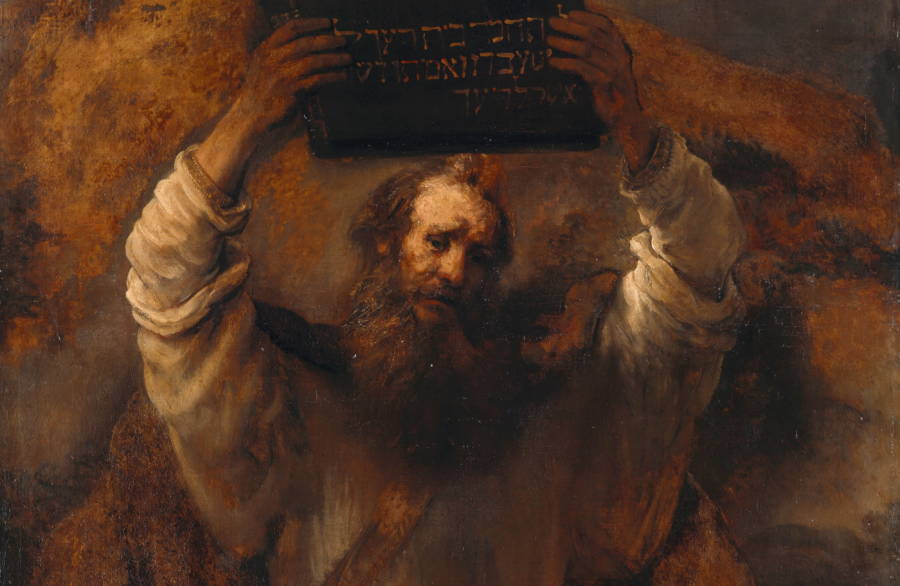
Wikimedia Commons Moses, as particoloured past Rembrandt.
According to both Judaic and Christian Dogma, the books of Genesis, Exodus, Leviticus, Numbers, and Book of Deuteronomy (the first quint books of the Bible and the entireness of the Torah) were altogether written by Moses in about 1,300 B.C. There are a couple of issues with this, however, such as the lack of evidence that Moses ever existed and the fact that the end of Deuteronomy describes the "author" dying and being interred.
Scholars have developed their have take connected who wrote the Bible's number one five books, mainly past using internal clues and piece of writing flair. Only as English speakers can roughly date a book that uses a good deal of "thee's" and "thou's," Bible scholars rump counterpoint the styles of these early books to create profiles of the different authors.
In each case, these writers are talked about As if they were a only person, just each author could just as easily be an entire school of people writing in a single way. These biblical "authors" include:
- E: "E" stands for Elohist, the key out given to the author(s) who referred to Supreme Being as "Elohim." In addition to a just bit of Exodus and a little bit of Numbers, the "E" author(s) are believed to be the ones who wrote the Bible's first initiation account in Genesis chapter indefinite.
Interestingly, withal, "Elohim" is plural, so chapter one originally stated that "Gods created the welki and earth." It's believed that this hearkens back to a clock time when proto-Judaism was polytheistic, though it was almost certainly a one-divinity religion by the 900s B.C., when "E" would have lived.
- J: "J" is believed to be the second author(s) of the first five books (so much of Genesis and some of Exodus), including the creation account in Genesis chapter two (the detailed ane where X is created first and at that place's a serpent). This name comes from "Jahwe," the German version of "YHWH" or "Yahweh," the mention this author used for God.
At incomparable time, J was thought to have lived close to the time of E, but there's just zero way that could atomic number 4 true. Some of the literary devices and turns of phrase that J uses could only possess been picked prepared sometime after 600 B.C., during the Someone incarceration in Babylon.
For case, "Eve" front appears in J's text when she is made from the rib of Disco biscuit. "Rib" is "ti" in Babylonian, and information technology's associated with the goddess Tiamat, the overprotect deity. A deal out of Babylonian mythology and astrology (including the stuff about Morning star, the Morning Star) snuck into the Bible in this way via the captivity.
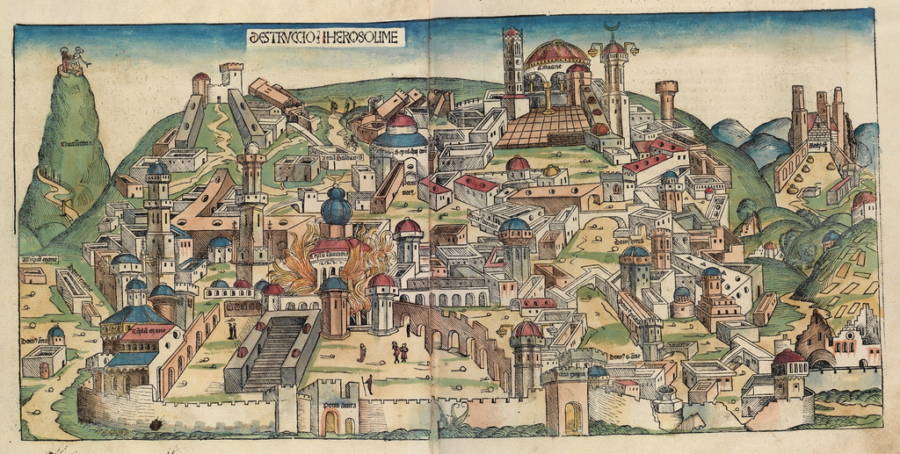
Wikimedia Park A depiction of the destruction of Jerusalem under Babylonian rule.
- P: "P" stands for "Priestly," and it almost certainly refers to a unimpaired school of writers living in and around Jerusalem in the unpunctual one-sixth century B.C., immediately after the Babylonian captivity ended. These writers were effectively reinventing their peoples' religion from fragmentary texts now lost.
P writers drafted almost all of the dietary and different clean laws, accented the sanctity of the Sabbath, wrote without end near Anna Mary Robertson Moses' crony Aaron (the first priest in Someone tradition) to the exclusion of Moses himself, and so forth.
P seems to have scrawled just a a couple of verses of Genesis and Book of Exodus, merely virtually all of Leviticus and Numbers. P authors are grand from the other writers by their use of quite a a pile of Aramaic words, mostly borrowed into Hebrew. In addition, approximately of the rules attributed to P are known to have been common among the Chaldeans of modern-solar day Iraq, whom the Israelites moldiness give birth acknowledged during their exile in Babylon, suggesting that the P texts were written subsequently that period.
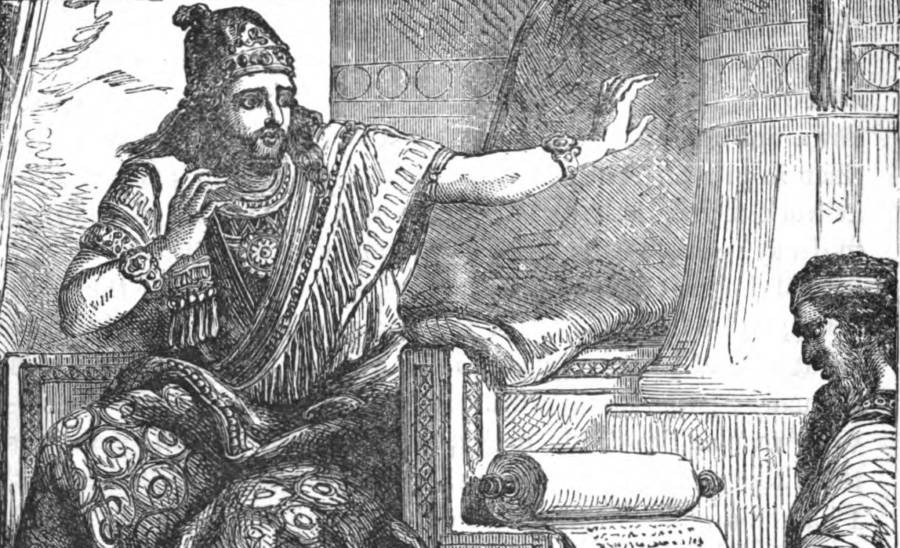
Wikimedia Common land King Josiah
- D: "D" is for "Deuteronomist," which means: "make fun who wrote Deuteronomy." D was also, like the other four, originally attributed to Moses, only that's only possible if Moses liked to publish in the third person, could see the future, misused speech no one in his ain time would sustain used, and knew where his possess grave would be (understandably, Moses was non who wrote the Word of God in the least).
D also takes minute asides to show just how much time has passed between the events represented and the time of his writing just about them — "there were Canaanites in the bring down then," "Israel has non had such a great prophet [as Moses] perfect to this very day" — once again disproving whatever notions that Moses was the unmatchable who wrote the Bible in any way.
Book of Deuteronomy was actually in writing much later. The text first came to light in the tenth year of the sovereignty of King Josiah of Juda, which was roughly 640 B.C. Josiah had inherited the throne from his father at age 8 and ruled through the Prophet Jeremiah until he was of get on.
Around 18, the King distinct to seize full control of Judah, so he dispatched Jeremiah to the Assyrians with a charge to fetch home the left diaspora Israelites. Then, he ordered a redevelopment of the Temple of Jerusalem, where Deuteronomy was supposedly found under the floor — OR and so Josiah's story goes.
Purporting to be a book by Anna Mary Robertson Moses himself, this text was a near-perfect equate for the cultural revolution that Josiah was superior at the time, suggesting that Josiah orchestrated this "discovery" to serve his own political and cultural ends.
This is roughly the equivalent of Chairperson Trump fishing or so in the Liberty Bell and claiming to find an amendment to the Constitution written aside Thomas Jefferson that requires presidents to build border walls — even though the supposed amendment uses recent words such as "email" and "cell."
Histories
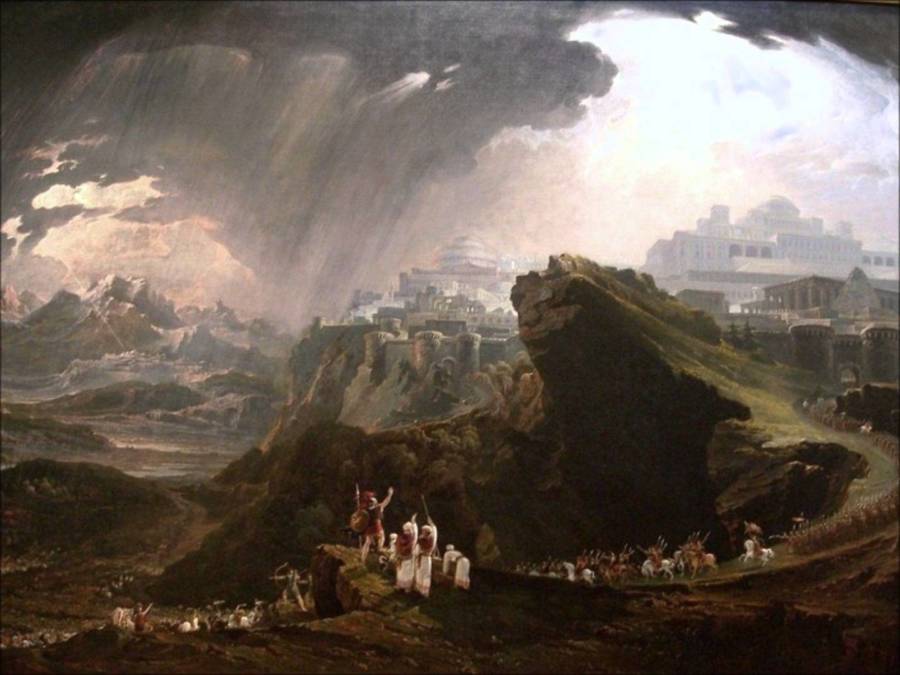
Wikimedia Green A depicting of the level in which Joshua and Yahweh lay down the sun stand still during conflict at Gibeon.
The next answers to the doubtfulness of who wrote the Book come from the books of Joshua, Judges, Samuel, and Kings, in general believed to have got been typewritten during the Babylonian captivity in the middle of the sixth one C B.C. Traditionally believed to have been written by Josue and Samuel themselves, they'atomic number 75 now often lumped in with Deuteronomy due to their similar panach and language.
Nevertheless, there is a substantial gap between the "discovery" of Deuteronomy under Josiah in about 640 B.C. and the middle of the Babylonian captivity somewhere around 550 B.C. Nevertheless, it's practicable that some of the youngest priests who were lively in the clip of Josiah were still animated when Babylon hauled off the gross area every bit captives.
Whether it was these priests of the Deuteronomy era or their successors that wrote Joshua, Judges, Samuel, and Kings, these texts represent a extremely mythologized history of their newly dispossessed people thanks to the Babylonian Captivity.
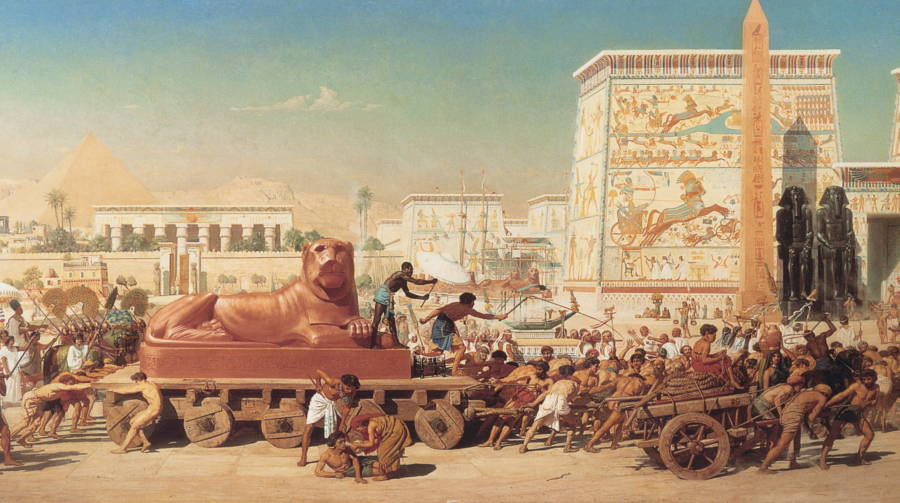
Wikimedia Commons A rendering of the Jews forced into labor during their time in Egypt.
This history opens with the Epistle to the Hebrews getting a commission from God to leave their Egyptian captivity (which credibly resonated with the contemporary readers who had the Babylonian Captivity on their minds) and utterly dominate the Holy Land.
The close division covers the eld of the heavy prophets, who were believed to be in daily reach with God, and who habitually humiliated the Canaanites' deities with feats of strength and miracles.
Finally, the two books of Kings cover the "Golden Age" of Israel, under the kings Paul, David, and Solomon, central around the tenth century B.C.
The intention of the authors here isn't hard to parse: Throughout the books of Kings, the reader is assailed with uninterrupted warnings non to idolise strange gods, or to take up the strangers' ways — peculiarly under consideration for a the great unwashe in the middle of the Metropolis captivity, freshly plunged into a foreign commonwealth and without a realize national identity of their own.
Who Wrote The Christian Bible: Prophets
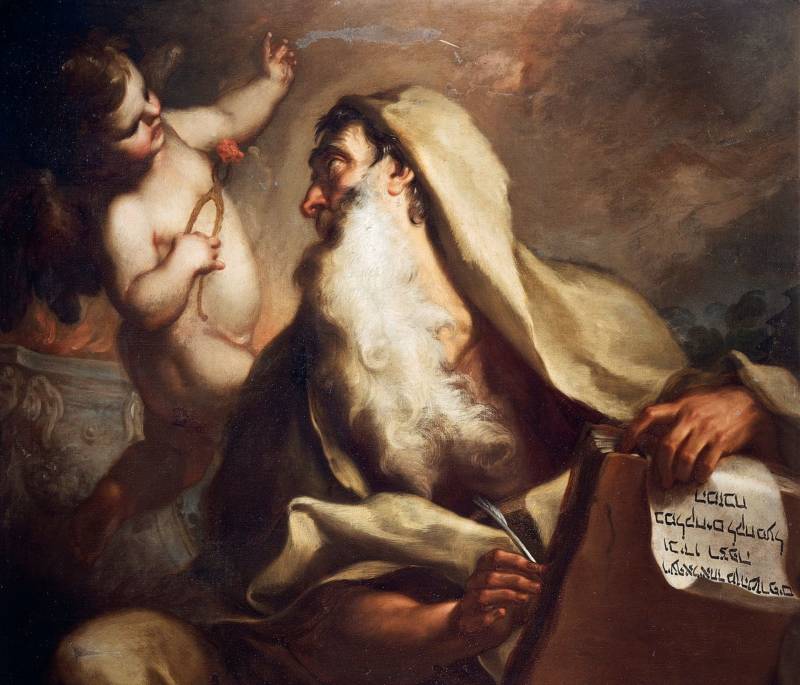
Wikimedia Commons The prophet Isaiah
The next texts to essay when investigation who wrote the Bible are those of the biblical Prophets, an eclectic group who generally traveled around the diverse Jewish communities to admonish citizenry and lay curses and sometimes preach sermons about everybody's shortcomings.
Just about prophets lived fashio back before the "Golden Age" while others did their work during and after the Babylonian captivity. Later, many of books of the Bible attributed to these prophets were largely graphic aside others and were fictionalized to the level of Aesop's Fables away people living centuries after the events in the books were supposed to have happened, for exemplar:
- Isaiah: Book of Isaiah was one of the greater prophets of Israel, and the Koran of the Bible attributed to him is agreed to have been written in basically three parts: early, middle, and dead.
Early, or "proto-" Book of Isaiah texts may undergo been written around the time when the man himself really lived, roughly the eighth century B.C., about the time when the Greeks were forward writing down feather Homer's stories. These writings tend from chapters combined to 39, and they're all doomsday and judgment for wicked Sio.
When Israel actually did fall with the Babylonian conquest and captivity, the works attributed to Book of Isaiah were dusted cancelled and expanded into what's at present known as chapters 40-55 by the same people who wrote Book of Deuteronomy and the real texts. This part of the book is frankly the ravings of an outraged patriot nearly how all the nasty, savage foreigners will someday be made to invite out what they've done to Israel. This section is where the terms "voice in the wilderness" and "swords into ploughshares" come with from.
Finally, the third part of the Book of Isaiah was intelligibly written after the Babylonian captivity concluded in 539 B.C. when the invading Persians permitted the Jews to return home. It's not surprising then that his section of Isaiah is a burbling tribute to the Farsi Cyrus the Of import, World Health Organization is known as the Messiah himself for letting the Jews return to their home.
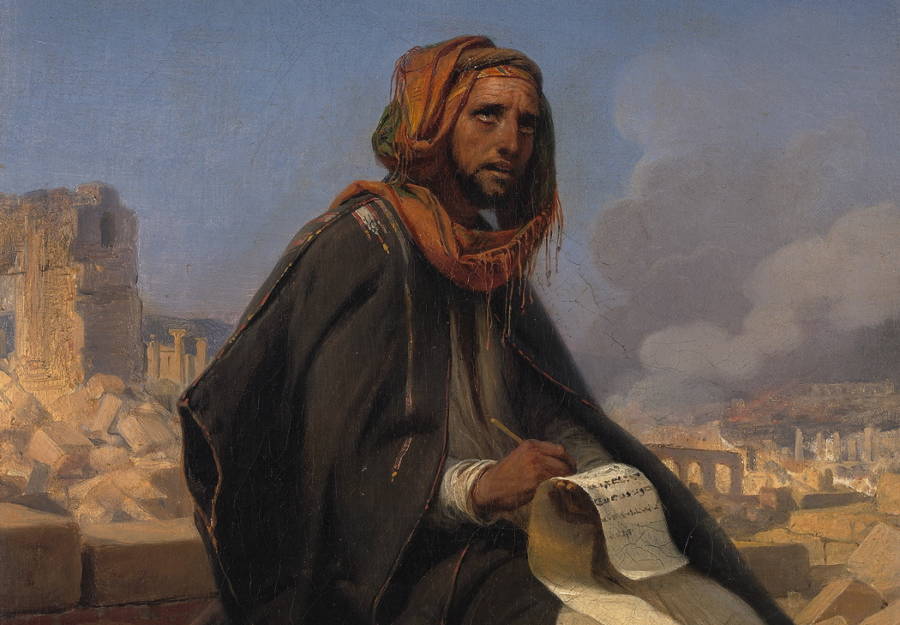
Wikimedia Commons The prophet Jeremiah
- Jeremiah: Jeremiah lived a century or indeed after Isaiah, immediately before the Babylonian imprisonment. The authorship of his book remains relatively blurred, even compared with past discussions as to who wrote the Bible.
He may have been unitary of the Deuteronomist writers, or he may have been one of the early "J" authors. His own book may have been written by him, or by a man named Baruch ben Neriah, whom he mentions Eastern Samoa one of his scribes. Either way, the Jeremiah has a very similar style to Kings, then it's possible that either Jeremiah operating room Baruch plainly wrote them all.
- Ezekiel: Ezekiel ben-Buzi was a priesthood member living in Babylon itself during the captivity.
In that location's no way He wrote the whole Good Book of Ezekiel himself, given the stylistic differences from one start to the next, but he English hawthorn have written some. His students/acolytes/junior assistants English hawthorn have written the rest. These also might have been the writers who survived Ezekiel to drawing the P texts after the captivity.
Wisdom book
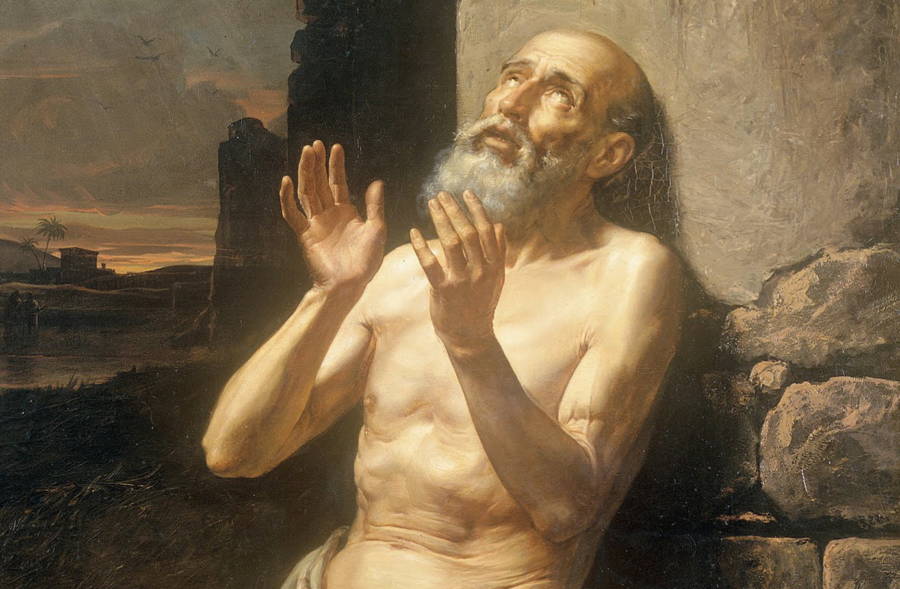
Wikimedia Common land Lin
The next division of the Bible — and the succeeding investigation into who wrote the Bible — deals with what's known arsenic the wisdom literature. These books are the fattening product of most a one thousand old age of ontogenesis and heavy redaction.
Different the histories, which are theoretically not-fiction accounts of overindulge that happened, wisdom literature has been redacted over the centuries with an extremely casual attitude that has made information technology hard to PIN pull down any single book to any individualist author. Just about patterns, however, have emerged:
- Job: The reserve of Job is actually two scripts. In the middle, it's a very ancient epic poem, like the E text. These two texts may be the oldest writings in the Christian Bible.
On either side of meat of that epic poem in the intervening of Job are much more recent Hagiographa. Information technology's as if Chaucer's The Canterbury Tales were to exist reissued now with an introduction and epilog by Stephen King as if the whole thing were one long text.
Section one of Job contains a very modern narrative of apparatus and exposition, which was typical of the Western tradition and indicates that this part was holographic after Alexander the Great swept ended Judah in 332 B.C. The happy ending of Job is too very much in this tradition.
'tween these cardinal sections, the list of misfortunes that Task endures, and his tumultuous confrontation with God, are left-slanting in a style that would have been around eight Oregon nine centuries old when the beginning and termination were written.
- Psalms/Proverbs: Like Job, Psalms and Proverbs are also cobbled together from some older and newer sources. E.g., about Psalms are written as if in that location's a reigning king on the throne in Jerusalem, while others directly mention the City captivity, during which clock there was course no king on the throne of Jerusalem. Proverbs was likewise continuously updated until about the mid-second century B.C.
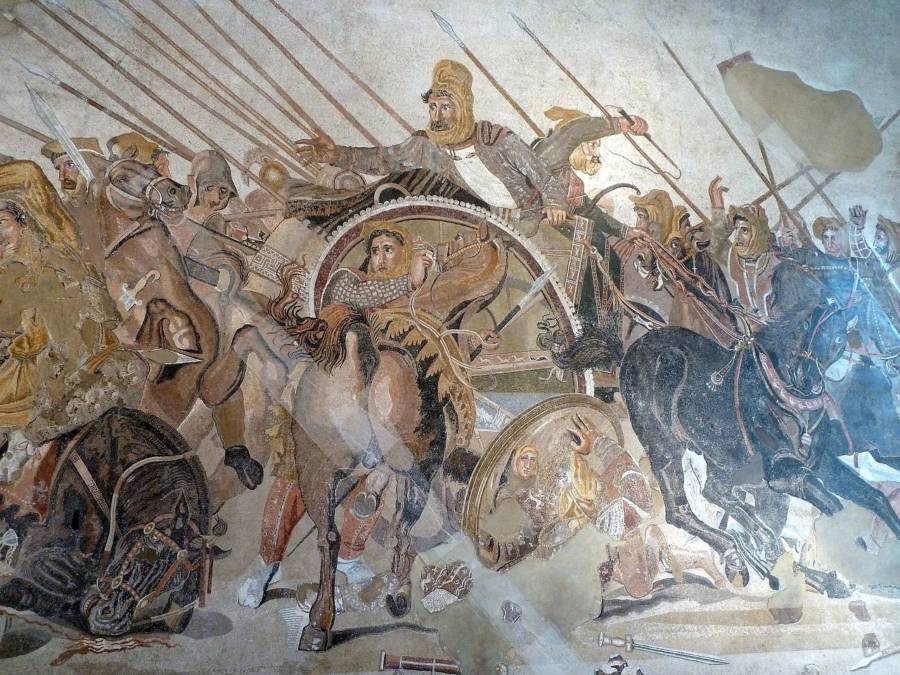
Wikimedia Commons A rendering of the Greeks taking Persia.
- Ptolemaic Period: The Ptolemaic geological period began with the Greek conquest of Persia in the late fourth century B.C. Before and so, the Jewish people had been doing very well low-level the Persians, and they were not happy about the Greek takeover.
Their important objection seems to have been cultural: Within a few decades of the conquering, Jewish manpower were flagrantly adopting Greek culture by medical dressing in togas and drinking wine in public places. Women were even teaching Greek to their children and donations were way down at synagogue.
The writings from this time are of a high technical quality, partly thanks to the hated Balkan state influence, but they also incline to be melancholy, as wel due to the hated Greek tempt. Books from this period include Ruth, Esther, Lamentations, Ezra, Nehemiah, Lamentations, and Ecclesiastes.
World Health Organization Wrote The Bible: The New Testament
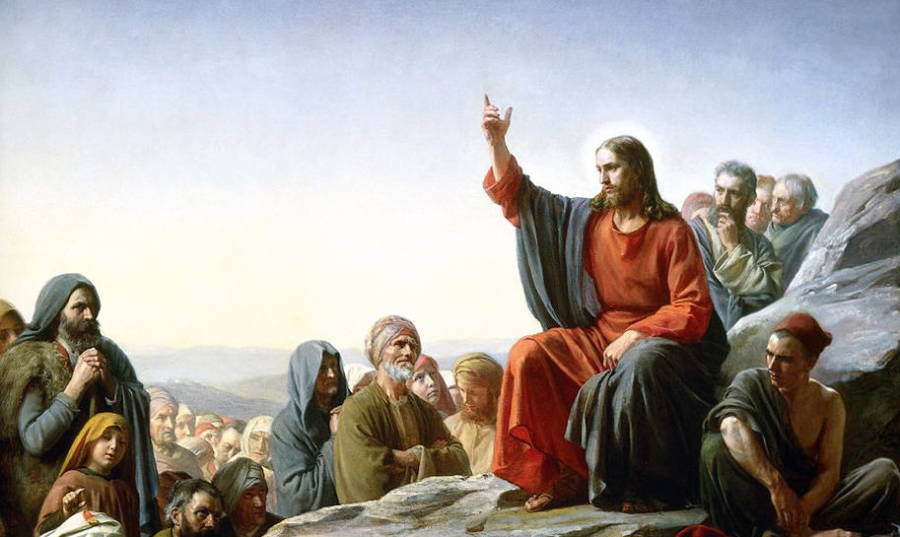
Wikimedia Commons A word-painting of Jesus delivering the Sermon along the Mountain.
Finally, the question of WHO wrote the Bible turns to the texts transaction with Jesus and beyond.
In the second century B.C. with the Greeks still in power, Jerusalem was lead past amply Hellenized kings who considered IT their delegac to wipe off Jewish identity with full acculturation.
Thereto end, King Antiochus Epiphanes had a Greek secondary school built crosswise the street from the Second Temple and made it a legal requirement for Jerusalem's men to visit it at least once. The intellection of denudation nude in a public situatio blew the minds of Jerusalem's faithful Jews, and they rose in unmerciful revolt to stop it.
In prison term, Hellenistic rule fell apart in the area and was replaced aside the Romans. It was during this time, early in the first century A.D., that one of the Jews from Nazareth inspired a new religion, one that saw itself as a continuation of Jewish tradition, but with scriptures of its own:
- Evangel: The four Evangel in the King James Bible — Matthew, Mark, Luke, and John — tell apart the story of The Nazarene' life and death (and what came after that). These books are titled after Jesus' apostles, although these books' actual authors Crataegus oxycantha have just been using those names for street cred.
The first Gospel truth to represent scripted may have been Mark, which then inspired Saint Matthew the Apostle and Luke (John differs from the others). Alternatively, all three whitethorn have been based on a now-confused older hold identified to scholars as Q. Whatever the event, evidence suggests that Acts seems to have been statute at the same time (the end of the first century A.D.) and by the equivalent author as Mark.

Wikimedia Commons Saul of Tarsu
- Epistles: The Epistles are a serial publication of letters, written to various early congregations in the east-central Mediterranean, by a one-on-one individual. Saul of Tarsus splendidly converted after an encounter with Jesus Christ on the road to Damascus, after which atomic number 2 changed his name to Paul and became the single most passionate missionary of the new religion. Along the way to his eventual martyrdom, Paul wrote Epistles of Jesse James, Peter, Johns, and St. Jude.
- Revelation of Saint John the Divine: The Apocalypse has traditionally been attributed to the Apostle John.
Different the other traditional attributions, this one wasn't very far murder in terms of actual historical authenticity, though this record was written a little late for someone who claimed to know Jesus personally. John, of Revelation celebrity, seems to have been a converted Jew who wrote his vision of the End Times on the Greek island of Patmos about 100 years aft Jesus' death.
Patc the writings attributed to John actually do show close to congruity between who wrote the Bible according to tradition and who wrote the Bible accordant to historical show, the question of Biblical penning remains thorny, complex, and contested.
After this deal WHO wrote the Bible, read raised on extraordinary of the most unique religious rituals practiced around the world. Then, have a look at both of the strangest things that Scientologists actually believe.
Where in the Bible Does It Talk About When a Baby Dies
Source: https://allthatsinteresting.com/who-wrote-the-bible
0 Response to "Where in the Bible Does It Talk About When a Baby Dies"
Post a Comment